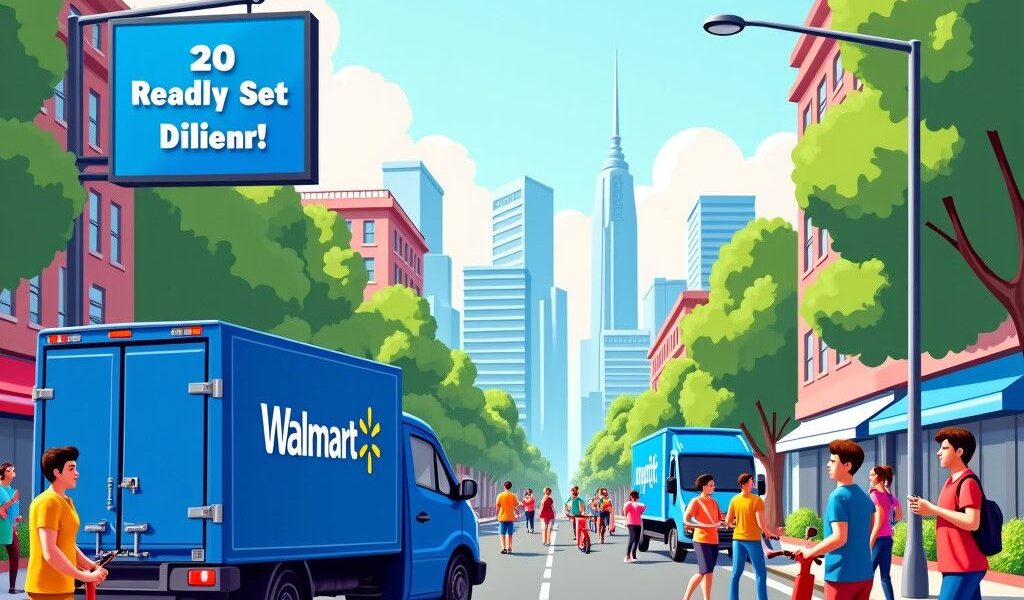Walmart is stepping up its game in the fast-paced world of quick commerce, launching a new initiative known as the “20 minutes plan.” This strategic move comes right after Flipkart’s introduction of its “Flipkart Minutes” service, setting the stage for a competitive showdown against established giants like Blinkit, Swiggy Instamart, and Zepto, all of whom are rapidly expanding their service offerings.
PhonePe has already made its mark in the quick commerce arena with its innovative Pincode app, which operates a 10-20 minute delivery service across major metropolitan areas in India. This service is currently focused on six urban markets: Bengaluru, Delhi NCR, Mumbai, Pune, Hyderabad, and Varanasi. Unlike many competitors that utilize dark stores to hold inventory, PhonePe’s approach is unique. By connecting community kirana stores directly with consumers, this asset-light model excels in reducing both inventory and overhead costs.
Flipkart’s introduction of its quick delivery service (Flipkart Minutes) adds another layer of competition. Currently, the service promises deliveries in just 8-16 minutes in select areas, with free delivery for orders exceeding Rs 99. This aggressive pace is indicative of the increasing demand for ultra-fast grocery delivery, as consumers increasingly seek convenience in their shopping experiences.
What’s particularly noteworthy about Walmart’s new initiative is its collaboration with local logistics partners. Reports indicate that the Pincode app will utilize its own delivery team alongside logistics partners like Shadowfax and Loadshare. This diversified fulfillment strategy is vital in ensuring a range of products, from groceries to household essentials, are delivered rapidly, satisfying customer expectations for quick service.
As this competitive landscape continues to evolve, it’s crucial to consider the broader implications. The quick commerce sector is forecasted to bloom into a $7 billion market by 2024. This potential growth has attracted heavy investment; for instance, Zepto has successfully raised over $1.3 billion this year alone, while Swiggy and Zomato are significantly bolstering their infrastructure to capture expanding market shares.
It’s also essential to recognize that Walmart’s moves are backed by extensive market analysis. With major players like Amazon reportedly preparing to enter the quick delivery sector through their service “Tez,” Walmart’s maneuvering reflects an urgent need to secure its position in a volatile market. The swift evolution of consumer behavior towards expecting nearly instantaneous delivery services is compelling e-commerce giants to innovate rapidly.
Examining the players involved exemplifies the challenges and opportunities within this space. For instance, the unique offering from PhonePe with its Pincode app could redefine how consumers interact with local vendors. This connection not only offers rapid delivery but also supports small businesses, creating a symbiotic relationship that could provide long-term benefits to both parties.
Additionally, the competitive landscape fosters innovation. Companies are compelled to enhance their logistics, optimize their technologies, and refine user experiences to maintain client loyalty. For instance, the integration of real-time tracking within apps enhances transparency and builds trust, which is indispensable in retaining clientele within the quick commerce sector.
Furthermore, there’s an interesting trend toward diverse product offerings in quick commerce. As seen in the pilot phase of PhonePe’s service, customers can expect a range of items including groceries, personal care products, and even sports equipment. This diversification not only meets immediate consumer needs but also establishes a more significant market presence, potentially increasing the frequency of transactions.
In conclusion, Walmart’s 20 minutes plan is more than just a reaction to Flipkart’s Minutes service. It signals the intensification of competition in the quick commerce sector, urging all players to innovate swiftly or risk obsolescence. As consumer expectations continue to evolve, the advancements in delivery capabilities, product offerings, and customer engagement strategies will determine which companies emerge as leaders in this rapidly changing market landscape. The next few years in instant delivery could redefine retail, placing enormous pressure not just on the player’s operational efficiencies but also on their capacity for customer-centric innovation.












